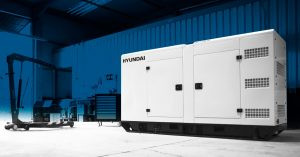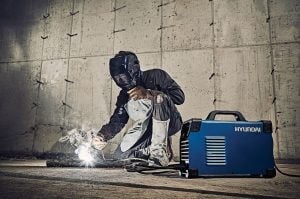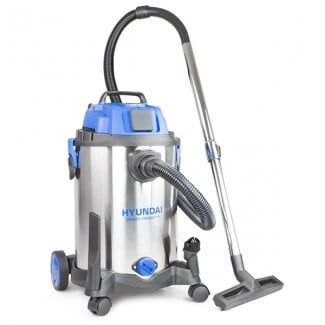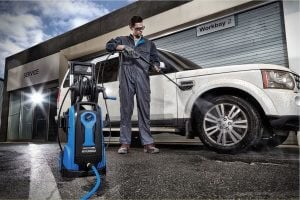
How To Choose The Correct Pressure Washer
In recent years the pressure washer has become one of those “must have” products for the home across the UK. When it comes to getting to grips with dirt and grime, tackling those hard to reach areas and outdoor surfaces, the versatility of the pressure washer means any home will have a need for a pressure washer.
From driveways and patios, wooden decking, dirt and grime around the home, cleaning those tough to reach gutters, cleaning cars and trucks to washing down lawnmowers, outdoor furniture, trailers and boats or even dirt bikes, the versatility of the pressure washer makes it one of the most sought after pieces of power equipment for any type of user.
With so much to consider when it comes to making your pressure washer purchase it’s easy to get confused, especially when it comes to some of the terminology used (we have highlighted all these definitions a little further on). We have created this helpful guide to take you step by step and ensure you are getting the correct machine for your needs.
WHAT TYPE OF PRESSURE WASHER USER ARE YOU?
The first thing to think about is what type of user are you? Are you buying your pressure washer for domestic applications around the home or are you looking for a machine to use day in day out on a professional level, or perhaps are you somewhere in between?
THE DOMESTIC USER
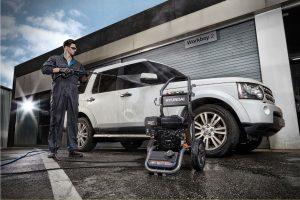
If you are simply looking at staying on top of those areas around the home and take pride in keeping the home, vehicle and patio areas looking sparkling all year round then the domestic machine is for you.
Domestic pressure washers are very affordable and are built with the DIY enthusiast in mind. These are not designed for everyday use but are perfect for the homeowner who likes to keep on top of those jobs around the home.
Domestic style pressure washers are mostly electric, major players in this market include Karcher, Ryobi, Bosch and Nilfisk. Hyundai have in recent years put their own stamp on the domestic pressure washer market with their petrol HYW3000P2 (Link below) For me, this will come down to how frequently you use your machine and personal preference in choosing between the electric or petrol domestic machines .
HYW3000P2: https://hyundaipowerequipment.co.uk/hyundai-hyw300...
THE SEMI-PROFESSIONAL USER
The semi professional user falls somewhere between the domestic and professional user. Let’s call this a high end domestic to light commercial kind of application.
These types of pressure washers will have a higher grade of engine and pump compared to the domestic units mentioned above. Designed for more serious upkeep and the more frequent user these will be perfect for tackling those jobs you’ve been putting off for too long and, perhaps as a weekend job, ideal for someone wanting to find their feet in the industry without the initial heavy outlay of a professional grade machine.
THE PROFESSIONAL USER
The professional pressure washer, as the name suggests, is designed for the commercial market. Coming in both petrol and diesel varieties these units will be a lot more powerful than the domestic or high end domestic user with both a higher quality of engine and pump. These units are designed to withstand daily heavy duty use in the toughest of environments.
AS A QUICK REFERENCE
The Domestic Units are ideally suited to cleaning smaller areas, bikes, cars and outdoor furniture.
The semi pro units are designed to tackle larger cleaning areas, decking, fencing and vehicles of most sizes.
The professional units are designed for commercial cleaning applications such as trucks, boats and ships, council applications that require high power equipment for removing graffiti as an example.
HOW MUCH SHOULD I LOOK TO SPEND ON MY PRESSURE WASHER?
Domestic user £80-£350
Semi Professional £350-£600
Professional user £600-£2000
The pressure washer market, like others when it comes to power equipment, is flooded with lots of cheap imitations and unbranded models. For myself as a rule if you don’t recognise the brand or if they do not appear In internet search terms or are not sold through major retailers I would suggest avoiding these.

From the outside looking in it may seem these are full of features but more often than not they are made with cheap components and poor build quality with minimal if any warranty. It’s also worth thinking about the availability of parts and after sales support. They often look the part but lack the power to handle the cleaning jobs you require and will eventually have you wishing you’d spent that little bit extra on a better unit from a known brand.
The better known brands in the pressure washer market will tend to be a much better pick whatever your application may be. While they may be a little more expensive than the non branded models they are often built to a higher quality and are much more robust to tackle the toughest of cleaning jobs.
They will also be more powerful, much more user friendly and generally have a quieter engine which your neighbours will thank you for when you are out doing your Sunday chores.
SHOULD I BUY A PETROL OR ELECTRIC PRESSURE WASHER?
In truth for me this totally comes down to how often you will be using the machine and your personal preference, both have their benefits.
Electric pressure washers are more targeted towards the domestic market. They are generally a lighter unit than the petrol, come with a number of accessories, better for the environment and easier to store away after use.
Petrol pressure washers tend to be much more robust and lend themselves well to the light commercial or professional applications. Because of their design it means they are much better suited to being transported over different terrains with their pneumatic tyres and with their more powerful engine and quality of pump they are able to handle the toughest of cleaning jobs.
HOW IMPORTANT IS THE PUMP ON MY PRESSURE WASHER?
In a word - “very” - again depending on the application of your pressure washer. Pressure washing requires a pump that will produce high pressure with low flow. It’s also essential that the pumps are lightweight, compact and economical.
Axial cam pumps used on most domestic pressure washers are direct drive, meaning they spin at the same speed as the engine. They tend to have a certain lifespan of around 300 hours and are not serviceable.
For a domestic machine that is being used the odd hour each month, the 300 hour lifespan is great. This is why they are used across all domestic grade machines in the Hyundai Power Equipment range. You transfer that 300 hours to a commercial use and you will be soon eating into the lifespan of that pump quite quickly over 8-10 hour working days. This is why choosing the correct washer for your needs is so important.
Triplex pressure washer pumps have driveshafts which run parallel to the driveshaft which powers the crankshaft. These types of pumps are designed with the professional user in mind, the lifespan of these units are greater than any other type of pump.
When looking at the Hyundai range all commercial grade units are fitted with the Italian Annovi Reverberi pump which is essential for professional cleaners, perfect for constant hard work and reliable performance.
FEATURES: ACCESSORIES & PATIO SURFACE CLEANERS
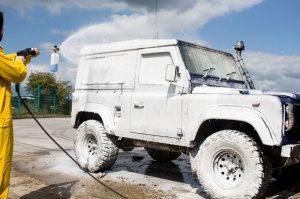
There are a range of features and accessories available for your pressure washer. The type of application of your pressure washer will determine whether or not you will have a need for some of these.
Telescopic Lance: The perfect accessory for cleaning areas that are normally considered inaccessible or hard to reach, such as rooftops, facias or other tall structures. This lance is designed to be used for tough cleaning jobs. Cleans areas from 6½ feet up to 18 feet high without the use of a ladder, whilst ensuring a quality finish to the job
Snow Foam Lance: Perfect for professional cleaners, this snow foam lance from BE Pressure is designed to produce total foam coverage for effective and efficient cleaning. To suit the cleaning job at hand, you can control the spread and flow of the foam, and like all BE Pressure products this is built to the highest standards with a stainless steel nozzle and brass manifold.This snow foam lance is suitable for use with pressure washers with a 60° max temperature.
U Bend Lance Extension: The perfect accessory to provide a high pressure gutter cleaner. Attached in seconds, it is a handy attachment that allows easy cleaning of car wheels and panels, or for commercial building cleaning in hard to reach areas such as guttering and hard-to-reach angled locations.
Detergent Tank: Many pressure washers will come in with a built-in detergent tank making cleaning tasks that much easier with their built-in soap dispenser.
Brush Attachments: If you are looking at cleaning delicate areas such as conservatories or perhaps greenhouses these attachments allow you to reach those delicate areas with minimal fuss.
Hose Storage: This can help keep your hose organised, in one place and can prevent any damage being caused when in storage.
Nozzle Water Broom: A water broom is a brilliant accessory for pressure washers as they make cleaning flat surfaces much easier and it prevents spray on to the surrounding areas. If you want a thorough clean then this is the accessory for you. Those hard to reach areas need no longer be a problem.
Rotary Turbo Nozzle: A rotary or rotating TURBO nozzle is the ideal addition to the end of your commercial lance. Packed with power, it's 'turbo' by nature, as well as by name.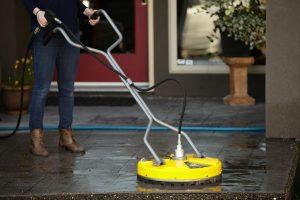
This rotary nozzle cleans faster than a regular nozzle. It is great for stripping paint or cleaning concrete surfaces. Use this with any pressure washer equipped with a quick connection.
Hyundai Power Equipment UK not only offers a fantastic range of pressure washers for every type of user they also bring a range of BE Pressure surface cleaners to the UK market.
The Whirlaway flat surface cleaner from BE Pressure makes it quick and easy for the operator to clean walkways, patios, decks, driveways, sidewalks, and other medium to large surface areas. These will make a fantastic accessory to your pressure washer purchase. If you would like any more information you can call the sales team on 01646 687880 . Please see the full range of surface cleaners and pressure washers in the link below:
https://hyundaipowerequipment.co.uk/pressure-washe...
Don’t be confused by pressure washer terminology: Here’s a breakdown of everything you need to know to make the correct purchase:
Petrol Pressure Washer Terms Glossary
PSI – The measurement of pressure which the pressure washer produces. Higher PSI usually means better cleaning performance, however always note the flow rate of the machine as well.
Flow Rate – How much water your pressure washer processes every minute or hour. The higher the flow rate, the more water you’ll be able to use over the given duration.
Engine – The source of power for petrol pressure washers, measured in cc or hp.
Pump – Processes the water and feeds it through the hose at a high pressure. Available from many manufacturers, such as Annovi Reverberi, General Interpump, CAT Pumps, etc.
Water Inlet – Connection for garden hose to feed water into the pump.
Water Outlet – Connects to the hose to transport water from the pump.
Hose – Connected from water outlet to the lance and transports the water. Various lengths are available.
Lance – A gun-shaped attachment which connects to the hose and puts you in control over the distribution of water via the trigger.
Nozzle – Attaches to the end of the lance and determines the spread of the water. They vary in size and application.
Turbo Nozzle – A large nozzle with a ball bearing inside it which concentrates the stream of water to enhance the cleaning power. Always check the maximum PSI rating.
Detergent Nozzle – Allows you to pull cleaning detergent through to the water feed on pressure washers which feature a detergent tank.
Detergent Tank – Available on select pressure washers, allowing you to fill with cleaning fluids which is then drawn through the lance with the correct detergent nozzle applied.
Pneumatic Tyres – Inflated tyres which improves maneuverability, usually larger than plastic tyres.
Wheel Brake – Found on large pressure washers, applied to keep the machine stationary.
Frame – The housing which surrounds the engine and pump. Materials for the frame vary depending on the brand and quality of the machine.
Anti-Vibration Feet – Two objects fixed to the base of the frame which connects to the ground and absorbs much of the vibration from the pump and engine to keep the pressure washer static during operation.
Unloader Valve – Regulates the pressure build-up to prevent overheating.
Recoil Start – The standard method of starting petrol pressure washers, via the use of a pull cord.
Electric Start – Another term for key start, providing a convenient alternative to recoil start.
Q/R – Abbreviation for “quick release” which is a connection method allowing you to simply pull back the collar to fit hoses and accessories.
Whirlaway / Flat Surface Cleaner – A type of pressure washer accessory which is used to clean flat surfaces, improving cleaning efficiency by up to 70%.
Snow Foam Lance – An accessory which fits on to the end of the lance and provides large coverage of foam onto a surface. Loosens mud and dirt allowing for an easier clean, best used on vehicles.
We hope you have found this guide helpful and made your pressure washer purchase a little less stressful. If you do have any questions regarding your pressure washer purchase you can call the Hyundai Power Equipment sales team on 01646 687880, they will be happy to answer any questions you may have.

 Expert Advice and Aftersales
Expert Advice and Aftersales Free UK Delivery*
Free UK Delivery*